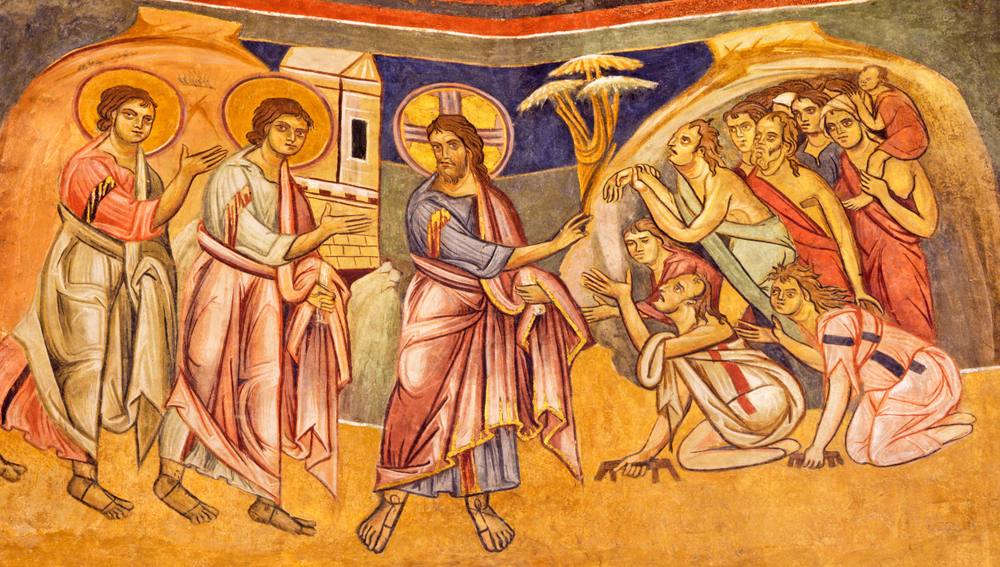The common theme in Sunday’s readings is that everyone has access to God’s healing power—you, me, non-believers, believers in other gods—everybody. God’s love is so far beyond the categories that we like to make for ourselves, and God takes his love so far that our gratitude is not a prerequisite for the gifts God gives.
Readings
2 Kings 5:14-17
“Now I know that there is no God in all the earth, except in Israel.”
2 Timothy 2:8-13
If we are unfaithful he remains faithful, for he cannot deny himself.
Luke 17:11-19
Then he said to him, “Stand up and go; your faith has saved you.”
You can read the full text of this Sunday’s readings here:
Scriptures for the Twenty-eighth Sunday in Ordinary Time, Cycle C
Reflection
In today’s first reading, Naaman, the commander of the Syrian army (not best buddies with Israel), is cured of leprosy by God. In his gratitude, he pledges his faith to God, renouncing worship of all other gods.
Paul speaks of his trials and sufferings while he is in jail for preaching the Gospel. He is willing to suffer, seeing it as being useful to the believers. This is interesting, because it shines a light on what the first reading and the Gospel both tell us—that, while suffering isn’t God’s desire for us, it can always be used to our benefit if we allow it. Naaman and the ten lepers had a new opportunity to know God’s care for them. Some took it and some didn’t.
The lepers were probably a mixed group—some were Samaritans and some were probably Jews. Jesus healed them all, not worrying about which was which. Of the ten, only one (a Samaritan, who as we know, would be considered something of an enemy to the Jews) came back to say “thank you.” The ones who didn’t come back stayed healed—the gift didn’t have strings—God’s gifts never do. Jesus healed them out of the love (charity) and compassion that flow from God. The healing offered to them wasn’t just physical. When Jesus says “your faith has healed you”, he’s not just referring to the leprosy. They were all healed of that. It was the response to the healing that made the grateful one truly well.
Break open the word with your family
Kids
Why do you think the lepers didn’t come back to say “thank you”?
Teens
We see in the two stories of healing today that, while the appropriate response to a gift is gratitude, God doesn’t force the issue. What does that tell you about what a true gift should be like? What does that tell you about what charity should be like?
Adults
Share a story about a time that you were affected by gratitude. It could be a time when you were deeply grateful, or someone was grateful to you. How did it affect you?
A little lectio
The ancient practice of prayerfully reflecting on bits of Scripture is known as lectio divina. Want to try it out with your family? Head over to Lectio Divina for Kidsto find out how to adapt this prayer practice for your kids.
A little Bible study
Want to do a little Bible study with your kids? Here are some tips:
- During Ordinary Time, the Church pairs the Old Testament and New Testament readings in a way that each sheds light on the other. Ask your kids to look for the common theme connecting the two readings. (Sometimes it’s obvious, sometimes it is subtle.) How does the “dialogue” between the readings help you understand them better?
- Get a New American Bible, Revised Edition, and take a look at the footnotes for these readings. How do they change your understanding of what is going on?
- Take a look at the context for the readings—what happens before, or after?
- Read the NABRE’s introduction to the book of the Bible that the readings are taken from. How does that help you understand the readings?
- If you don’t have a copy of the NABRE at home, you can view it online at the USCCB website at the Daily Readings web page.
For even more resources for breaking open this Sunday’s readings, head over to The Sunday Website.



